

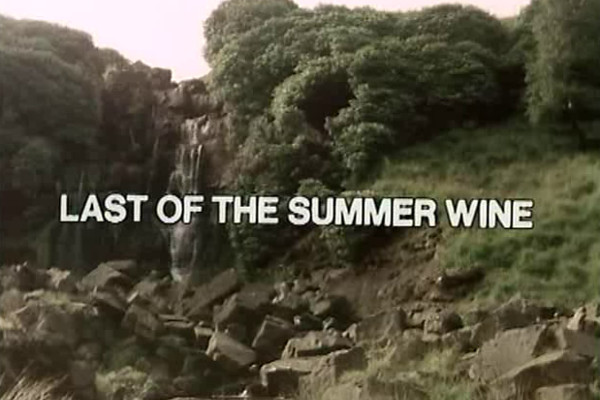
The DVD of the season can be ordered online from Amazon. In the meantime, please join me as I rank the episodes from worst to best...
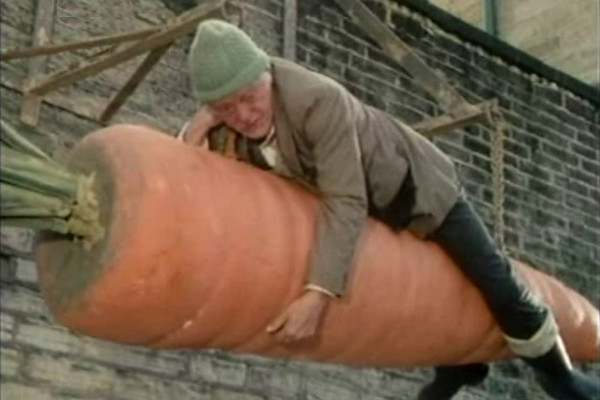
Series four was, with one exception, the last season of the programme to be a post-watershed affair. While this still isn't quite the cosy, somewhat formulaic Sunday teatime show it became, the signs are here in a very slapstick instalment. Featuring Compo on top of a giant display carrot, calling out "morning vicar" to a passing clergyman, it's very "easy" in terms of laughs and intent.
Better is a conversation between Foggy and Compo on the nature of infinity, which ends with Compo discussing reflections in two opposing mirrors in a chip shop: "Now some clever twonk might think he's in infinity when he looks in that mirror, right? When all the time he's in some tatty little chip shop." Sadly, this philosophical debate gets just polite, even bemused, chuckles from the audience, whereas Compo in distress, or talking about his "shriveller" gets roars from the back row. That this episode ends with something falling down a hill on a cart perhaps goes without saying...
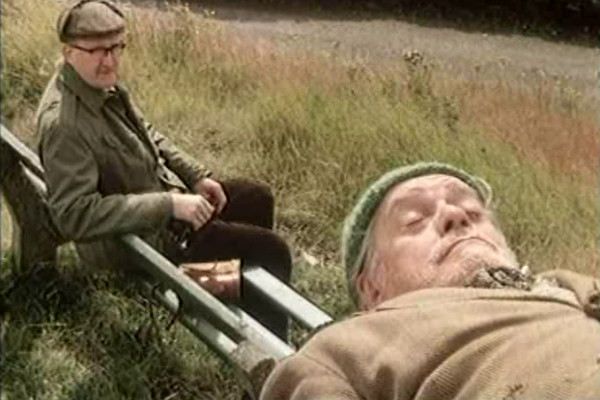
A weak season opener with, even by the standards of the early years, a minimal plot: Compo has lost a ferret in Nora Batty's house. While Roy Clarke is capable of being a fine writer with a gifted ear for dialogue, character diversity is not always one of his strengths, and the mountain of shrieking harridans that make their way through the series do lead towards repetition. Kathy Staff is a fine actress, but her continually beating the Hell out of Compo with a brush while he acts like a sex predator doesn't perhaps deserve to be the mainstay of the series that it became.

An episode that starts off strongly, with Clegg musing over the idea that churches might go "self-service" and a striking ending with Compo wondering what they'll put on his gravestone... a scene made eerie by the knowledge that it was filmed in the graveyard where Bill Owen was actually buried.
Sadly, what's sandwiched in between is far more "sitcommy" than seen before in the series, with comedy vicars, knights in armour, and the leads dressed up in "funny" costumes. Once the programme spoke about life, but with instalments like this, it needs do no more than have Compo dressed as an admiral while a fete float rises not more than a 30 degree angle to have the studio audience in hysterics.
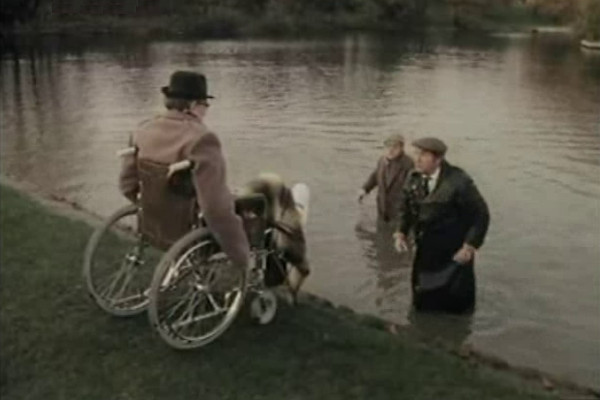
Now fully ensconced into the trio, Brian Wilde's Foggy doesn't get as much chance to shine as he did in his first season. Indeed, what had been his regular trademark of staring into space only gets two outings in the episodes covered here, and his military fixations are often pushed to the background while Compo is pushed centrestage.
Although this episode is ostensibly about Foggy (having an unlikely romance in Wales) the main action sees Clegg and Compo travelling to see him. While the series is known for its beautiful views, this is a rare instance where the weather doesn't hold up, with much of it filmed during what are clearly thunderstorms on the horizon.
While the episode is a fine one, it ranks low in the run here as it feels like it needed another draft, or an extended runtime: Compo and Clegg meeting Foggy and ruining his budding romance is the centrepiece of the plot, but it doesn't even come into play until seven minutes before the end titles. As it stands, it's an offbeat episode that doesn't quite come together, even if it ends, as pictured, with what is already becoming an obligatory "someone falls down a hill" scenario.
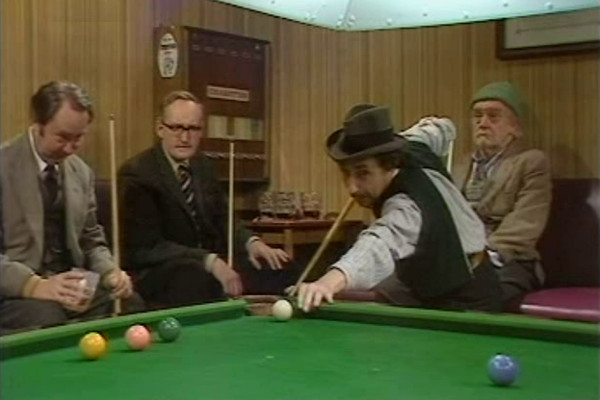
The wonderful thing about early Last of the Summer Wine is that the players, no matter how broad, tend to give acting performances, rather than a "sitcom" portrayal. This is somewhat undermined here by Timothy Bateson (seen later that same year as the similarly broad "Binro The Heretic" in Doctor Who) giving very much a "turn" as guest part Amos. It's not dreadful, but it's not really the usual realm of the programme, which still attempts for some form of realism at this stage, even if that realism involves going down a hill at speed.
Sadly, it also affects the others to greater and lesser extents, with the fine acting of Peter Sallis getting more unnaturally "comic" than before, particularly in a scene where he thinks he's dying. Add to this a chip shop owner who's Sid by any other name, some more "comedy" with a stalling car and a shop full of screaming old ladies and it's very "trad 70s sitcom" fare.
Speaking of traditional 70s sitcoms, then the presence of what would today be regarded as casual homophobia does make its presence felt, especially with Compo's attitude towards Foggy. In Foggy's first appearance he was mocked by Compo as looking just like "a silent movie queer", and here Compo reassures Amos that Foggy is "just a big fairy." "Damn nasty sort, these fairies" comes the reply. Such moments may be striking in 2018, but in a period where even mainstream quiz shows like 3-2-1 were doing rape gags, it's a reminder that such things should be regarded as historical documents, and that you cannot assess such shows by the standards of today.
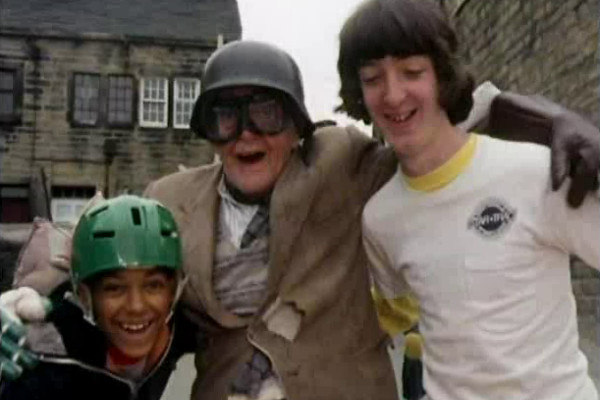
The first of 23 official Christmas specials, which aired on Boxing Day 1978. Continuity is sometimes tentative in the programme (as with Clegg's variable stance towards driving) and while it's a solid choice to have Compo in childlike thrall to the festive season, it does contradict his line in A Merry Heatwave where he was adamant that "I don't like Christmas". Perhaps real life was also driving events: broadcast during Britain's winter of discontent, with heavy strike action and the coldest weather for over 15 years, this broad special acts as the antidote to a more dour reality.
Although it's charming seeing all three opening presents together, it does seem as if Roy Clarke now realises what the audience really wants: there's no bigger laugh than when Compo tells Foggy to stop looking at his nuts. This said, Wally Batty again gets more than his share of decent lines: "Why don't you go and sit down, Nora... you've been on your mouth all day."
The ending suffers from another badly-staged "stunt", whereby cutaway reaction shots are supposed to gloss over the fact that Bill Owen very obviously doesn't crash into a brass band on a skateboard... the reactions of the people playing the band particularly bad. All said, though, as the first Christmas Special proper, this does have a kind of warm charm.
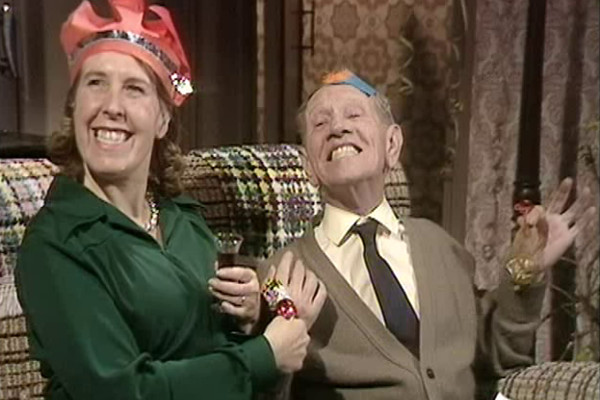
Set in mid-summer, this episode sees the trio attempt to film a mock Christmas video of the village to send to Nora's sick brother back in Australia. The episode is slightly longer than normal, indicating that it had perhaps been intended as a first Christmas special, yet it wasn't screened until January 1978.
A fairly inspired episode that almost mocks the concept of Christmas specials being filmed much earlier, this is nevertheless just fairly average for a fourth season that's weaker in general than before. And look out for an early shot of the trio outside the café... for once, the "exterior" is filmed inside a studio, with an incredibly poor painted backdrop unconvincingly substituting for the familiar street that has been seen in so many prior episodes.
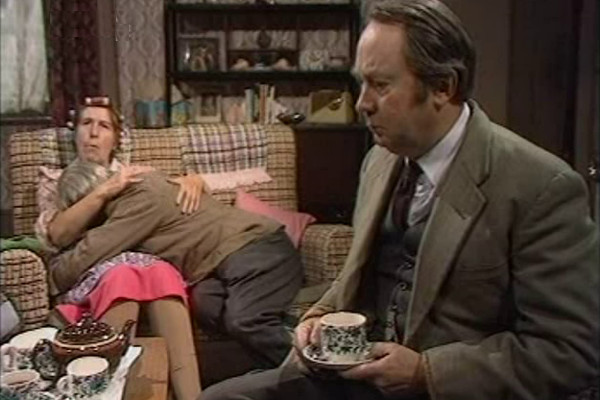
It's often the small touches that make a Last of the Summer Wine episode a standout. The central "plot" here – Sid wants to get a doorbell installed in the café, while Ivy is predictably not impressed by his attempts – is one of the lesser efforts. Yet there's unexpected touches, like Compo stopping in the middle of a deserted street, full of rubble, to open up to Clegg about how he used to date a girl there, forty years earlier. "I wonder if she still thinks about me?" he muses, while elsewhere Foggy is concerned that he's losing track of time in his retirement: "It's so easy to drift into uselessness."
While I've stated on several occasions in these articles that I find Compo's "dirty old man" schtick to be an element of the series that I'm very uncomfortable with, Bill Owen's enthused performance as he's nestled into Nora Batty's chest is one of the more amusing moments on offer. Lastly, look out for the ending where an exterior shot of a public toilet appears for almost a minute of screentime, with the three leads overdubbing their voices from the "inside". It's a bold, almost innovative touch to the direction that can be seen reflected throughout this season, from extreme long shots of the three of them on a hill top, to an almost silhouette of their shape.
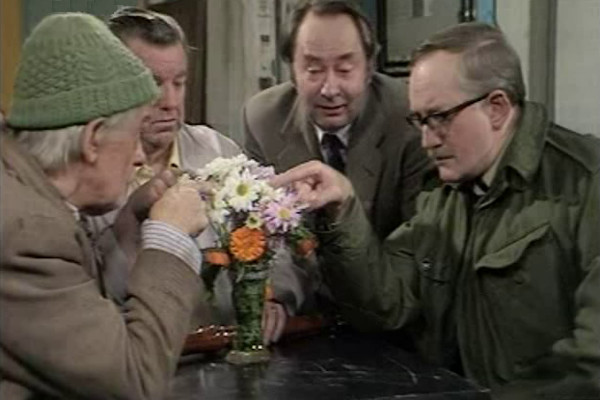
The finest episode of the season features more of the darkness that the early episodes are best at. When a previously-unseen friend of the trio dies, they ruminate on the nature of death, with Compo deciding "I want to celebrate being alive." This leads on to Clegg making them believe that flowers respond to human emotions, something narrated as just a prank for an audio adaptation, but it appears to be genuine on TV.
These early episodes generally involved careful and luxurious filming, years before Alan J W Bell took over and streamlined the process. Although wonderful to look at, it's striking that two mistakes find their way onscreen here: the first is the opening scene, with Clegg having his back to the camera, before a cutaway shot reveals him to be facing it. Much more charming is a later moment where Peter Sallis nearly falls off his seat in the café, laughs, then stays in character. Such things echo another season four episode (A Merry Heatwave) where Sallis begins to break at Owen's performance, and Owen begins to smile back in turn... a heartwarming sign that the two had real affection for one another.